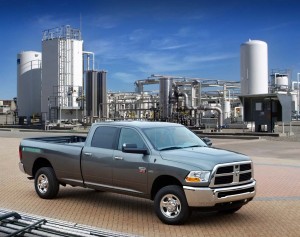It’s been hailed as a clean, cost-effective alternative to gasoline – as well as coal – but there are some new doubts being raised about the environmental benefits of natural gas.
The fuel has been gaining support, especially in the auto industry, where proponents are pressing to get more manufacturers to offer compressed natural gas, or CNG, options. And with production rapidly expanding along with the increased of fracking-style drilling, even President Obama is lending his support as a way to reduce both America’s dependence upon foreign oil and the production of global-warming CO2 gas.
But a new study by a group of scientists from various federal labs, as well as MIT, Stanford, Harvard and four other universities is throwing that optimism into question. If anything, natural gas “is not likely to reduce greenhouse gas emissions,” cautions the study’s lead author Adam Brandt, of Stanford. At best, switching a car from gasoline to CNG is “on the borderline in terms of (the benefits to) the climate,” he says.
The problem isn’t actually with natural gas itself, the researchers emphasize. It’s with the way the fuel is produced.
Like petroleum, natural gas is sourced from underground deposits, often from the same wells. For many years, a sizable amount of the gas was “flared,” or burned off at the well site, because of either low demand or because of difficulties in transporting it to markets where it could be used.
More pipelines are being built and other transport methods – such as specially designed supertankers – have become available.
(Ford gassing up with CNG. Click Here for the story.)
And just in time. The energy industry has been rapidly expanding the use of so-called fracking, sending a mix of lubricants and other materials into wells to crack rock formations to access vast underground stores of oil and natural gas that had long been considered out of reach.
Fracking has plenty of critics who blame it for everything from localized earthquakes to water pollution. But now they may have another cause to rally around. The problem is that some of the gas generated from drilling is leaking into the atmosphere at the wellhead. How much is a matter of debate. The U.S. Environmental Protection Agency sets the figure at about 1.5% of the total gas released by drilling. Stanford’s Brandt says his data suggest it could be well over 2%.
A separate 2012 study by the Environmental Defense Fund warned that this could actually result in a long-term increase of global warming gases.
Not everyone buys into the results of the new study, particularly the trade group, Natural Gas Vehicles for America, which counters that using natural gas reduces vehicular CO2 emissions by 29% compared to gasoline and 22% versus diesel.
On Tuesday, President Barack Obama announced plans to develop new rules meant to improve the fuel economy of medium- and heavy-duty trucks while reducing their global warming footprint. Among other things, the White House is pushing for a $2 billion fund to support development of alternative power technologies, including not only batteries but CNG.
“If extracted safely, it’s the bridge fuel that can power our economy with less of the carbon pollution that causes climate change,” Obama said in January, during his State of the Union address.
(For more on the president’s position on CNG, Click Here.)
Until recently, the choice for motorists and truckers was limited but there has been a move towards adding more CNG-fueled options. Honda, which has offered a natural gas-fueled version of its Civic recently updated that model, while General Motors is preparing a version of its Chevrolet Impala sedan. Other models are in the pipeline.
(Click Here for more on the new CNG Impala.)
Meanwhile, there’s growing use of the gas as an alternative to coal in powerplants around the country.
It remains to be seen if the new CNG emissions will slow that switch down.


The media continues to perpetuate the false statement that the U.S. is dependent on foreign crude. This is blatantly FALSE.
The oil companies buy foreign crude because it increases their profits some of U.S. crude. Because they are a Cabal and control the price of crude they can reap windfall fortunes. By making large PAC contributions the criminals in DC allow the oil industry to rape the public on crude prices.
To perpetuate that the U.S. is dependent on forign crude is wrong and false.